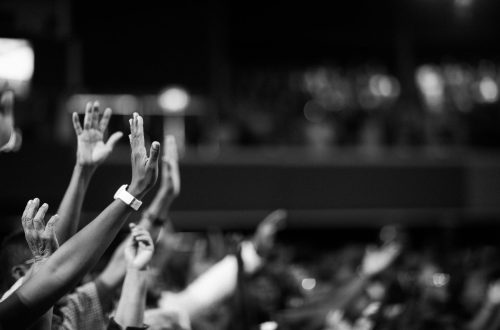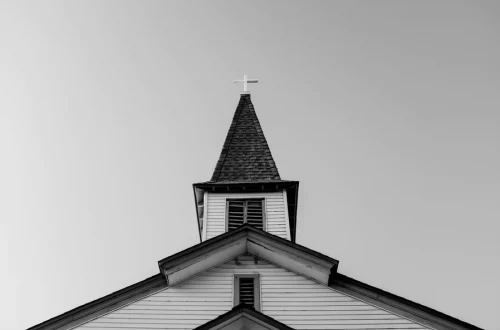 The New York Times ran a story on Friday highlighting the deconversion of Sarah Jones, a recent graduate from a Christian college. Jones is a young woman who grew up in a fundamentalist home, attended a Christian college, and then fell away from the faith. She has now crossed all the way over to the other side and works for a liberal interest group that opposes Christianity. It is a sad story, and perhaps the best response to her situation is simply to pray for this girl and her family. The Lord’s arm is not too short to save (Isaiah 59:1).
The New York Times ran a story on Friday highlighting the deconversion of Sarah Jones, a recent graduate from a Christian college. Jones is a young woman who grew up in a fundamentalist home, attended a Christian college, and then fell away from the faith. She has now crossed all the way over to the other side and works for a liberal interest group that opposes Christianity. It is a sad story, and perhaps the best response to her situation is simply to pray for this girl and her family. The Lord’s arm is not too short to save (Isaiah 59:1).
The original version of this blog post questioned whether The New York Times ever published conversion stories in the other direction—from secular liberal to conservative Christian. It turns out that they do. The author Mark Oppenheimer provides some examples that he has written (here, here, and here). Still, there is one profile that I would love to see Oppenheimer tackle. Rosaria Butterfield’s journey from tenured lesbian professor to committed evangelical Christian is one of the most compelling and provocative that I have ever seen. She published her story just two years ago, yet it has been largely overlooked by outlets like The New York Times. I would love to see that change.




15 Comments
Paul Reed
It’s interesting when people convert to a worldview that differs than the one in which they grew up. Had the young woman in this article have grown up in a relatively liberal household, then her being ultra-liberal wouldn’t be interesting at all. Similarly a person who grows up in a Christian household, has a wild youth, and then goes back to being Christian is so common and boring that it’s almost a cliche. (Google “Volva driving soccer mom”). Now, let’s say a person grows up in a liberal or Muslim household and converts to true Christianity. Then that would actually be interesting, and something we’d all like to hear more about.
Roy Fuller
I guess my question would be: are you really surprised the NYT published a story which raised questions about conservative/fundamentalist religion and institutions? I don’t think you are. I would disagree with the characterization of Americans United for the Separation of Church and State as a “liberal interest group that opposes Christianity.” Partly true, in that AU can be characterized as “liberal” on our political spectrum. But would it not be more accurate to say that they oppose the historic privileged position of Protestant Christianity in American political and religious life, and that they advocate for a more stringent separation of church and state than do you? I realize many people reading this blog will agree with your assessment, and I personally would not support all of AU’s positions, but isn’t saying they “oppose” Christianity a little over-the-top, especially in light of the reality that many Christians support Americans United?
JL Parks
I feel sorry for this woman’s battle with depression, and hope she can overcome it. But being raised in a Christian family no more makes a person a Christian, than living in a garage makes one a car. It is fairly obvious she has never been truly saved, because no truly saved person can ever deny the existence of the God of their salvation. I agree with Denny- she needs the Lord’s strong arm of salvation. Matthew and luke both write of those standing outside a locked door, longing to get in, having thought all along that they knew Jesus. The problem is, that Jesus never knew them.
Gus Nelson
Roy Fuller: In principle Americans United may claim that all it is doing is seeking to separate church and state. However, if you go to its website (https://www.au.org/) there is nothing to distinguish the organization as having any Christian concerns at all. In fact, as you read what it says, it becomes very clear this organization exists to limit, as much as possible, the impact of religion in the public square. It is not just for separation of church and state, it is for the church having zero impact on the state. There’s a big difference.
James Stanton
I’m not sure where the line is between acceptable separation of church and state and the church having zero impact on the state.
” In fact, as you read what it says, it becomes very clear this organization exists to limit, as much as possible, the impact of religion in the public square.”
That’s exactly the organization’s reason for being, in a nutshell.
I don’t consider being for separation of church and state a particularly liberal position although I understand why today’s politics makes it so. It was definitely an issue in the early years of the republic. In the same vein, I hesitate to consider the NRA as a partisan, conservative organization even though a majority of its members are likely political conservatives. Both organizations and the underlying policies transcend political labels when you’re dealing with a single, important issue of contention.
Can conservatives be for separation of church and state? Yes. Can liberals support the 2nd amendment? Yes.
Roy Fuller
Guy, AU is not a Christian organization, I don’t think anyone here has said it is. I said that it is supported by many Christians, which it is. And which is why I object to Burk claiming that AU “opposes Christianity.” What they oppose is religious influence upon the state, and the state supporting religion. As James points out, there are many opinions about where the line of separation of faith and state should be, and that is a fruitful discussion to have. I would not support all of AU’s positions, but neither would I say they oppose Christianity, because that implied they are seeking to tear down one religion, when in reality they are seeking to treat all the same. They certainly support a more stringent separation than many more conservative Christians would like. As a Baptist, I appreciate groups like AU, and the Baptist Joint Committee, who stand guard against those who would seek privileged status.
John Kreiner
Not everything Americans United does is bad. However, they are consistently for the teaching of evolution in the schools and against teaching of creationism and intelligent design. Many Christians (myself included) consider the teaching of evolution in public schools as anti-Christian. If they do not oppose Christianity sometimes in some sense, why do they support the teaching of anti-religious viewpoints in public schools? Why should they fight to give anti-religious viewpoints privileged status?
Roy Fuller
Not to play an semantics game, but AU opposes the teaching of religion as science in public schools. We can debate the anti-religious nature of evolutionary theory, but creationism (and intelligent design) have a religious component, and AU opposes teaching one view of religion as truth in a publicly paid for setting such as a public school. AU would argue that keeping such religious views from being taught is maintaining the separation of church of state.
John Kreiner
AU doesn’t have to support the teaching of creation or ID; it can merely say that origins should not be taught in schools at all, if they don’t want to oppose the many Christians who believe evolution is anti-religious teaching. The fact that they support it being taught in schools against those who oppose it just says that as far as Denny Burk’s point about AU opposing Christianity, if it is rephrased to say that AU “often” opposes Christianity, it is absolutely true.
Denny Burk
Hey, everybody. Thanks for your comments. In the original version of this blog post, I questioned whether The New York Times published conversion stories in the other direction. I also questioned whether Oppenheimer’s article was using Sarah Jones’s story to cast evangelical views and institutions in a bad light. After Opppenheimer provided some examples of previous writing he’s done on conversion in the other direction, I decided to edit the original blog post. The version that is there now removes my original line of questions. Also, Sarah Jones asked me to use her name, and I have made that change as well.
Roy Fuller
So, no adjustment on the claim that Americans United “opposes Christianity?” How about “opposes Christianity in the public square,” or “opposes the influence of religion on politics?” I guess that is too much to ask.
Ray DeFrese
Another reason we need to teach our children at least some rudimentary apologetics and prepare them for the pluralistic world they’re bound to encounter when they go off to college. Don’t send them away with borrowed faith.
Esther O'Reilly
Amen to that.
Esther O'Reilly
Oh, she took a philosophy class. That’s cute.
Dan Phillips
Another illustration of PA#33 (http://bit.ly/MTJJox).